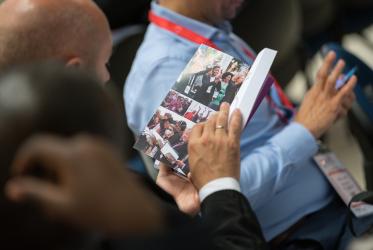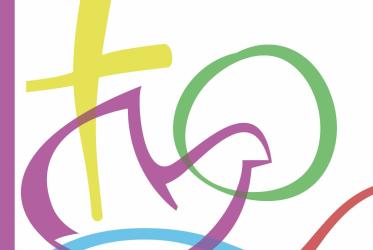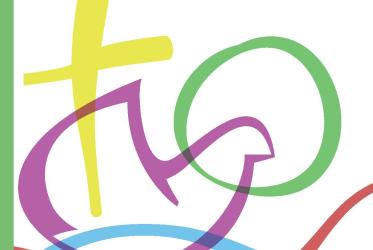Introduction
Holy Week is a particularly rich liturgical period of the year which prepares the faithful to meet the risen Christ, since it culminates on Easter. It is the “feast of the feasts” in the Eastern Orthodox Church. Holy Week focuses on the last days of the earthly life of our Lord and Saviour Jesus Christ, his ultimate predication, and his salvific passion. On Holy Thursday, the Orthodox commemorates not only the last meal of the Saviour, which is called the “Mystical Supper,” but also the washing of the feet of the disciples by Christ, which preceded it, as we read in the gospel.
Bible passage: John 13:1-17
Now before the festival of the Passover, Jesus knew that his hour had come to depart from this world and go to the Father. Having loved his own who were in the world, he loved them to the end. The devil had already put it into the heart of Judas son of Simon Iscariot to betray him. And during supper Jesus, knowing that the Father had given all things into his hands, and that he had come from God and was going to God, got up from the table, took off his outer robe, and tied a towel around himself. Then he poured water into a basin and began to wash the disciples’ feet and to wipe them with the towel that was tied around him. He came to Simon Peter, who said to him, “Lord, are you going to wash my feet?” Jesus answered, “You do not know now what I am doing, but later you will understand.” Peter said to him, “You will never wash my feet.” Jesus answered, “Unless I wash you, you have no share with me.” Simon Peter said to him, “Lord, not my feet only but also my hands and my head!” Jesus said to him, “One who has bathed does not need to wash, except for the feet, but is entirely clean. And you are clean, though not all of you.” For he knew who was to betray him; for this reason he said, “Not all of you are clean.”
After he had washed their feet, had put on his robe, and had returned to the table, he said to them, “Do you know what I have done to you? You call me Teacher and Lord—and you are right, for that is what I am. So if I, your Lord and Teacher, have washed your feet, you also ought to wash one another’s feet. For I have set you an example, that you also should do as I have done to you. Very truly, I tell you, servants are not greater than their master, nor are messengers greater than the one who sent them. If you know these things, you are blessed if you do them.”
Reflection
The events initiated by Jesus Christ which are linked with the Mystical Supper are extremely significant. On that occasion, he shared the last words of his teaching and gave his final instructions to his disciples. He established the eucharist, which would become the gathering par excellence of his Mystical Body, the Church. By washing the feet of his disciples, he gave them an example of humility and of mutual love, inviting them to reproduce it: “So if I, your Lord and Teacher, have washed your feet, you also ought to wash one another’s feet. For I have set you an example, that you also should do as I have done to you. … If you know these things, you are blessed if you do them.”
By this act of washing his disciples’ feet, Jesus Christ summarized the meaning of his ministry, manifested his perfect love and revealed his profound humility. He “did not come to be served, but to serve, and to give his life as a ransom for many” (Matt. 20:28). The washing of the feet is indeed closely linked to his sacrifice on the cross. The washing of the feet and the crucifixion both reveal the kenosis of Christ, “who, though he was in the form of God, … emptied himself, taking the form of a slave, being born in human likeness. And being found in human form, he humbled himself and became obedient to the point of death—even death on a cross” (Phil. 2:6-8). The washing of the feet signifies Christ’s love and the giving of himself to each person according to that person’s ability to receive him, since as he said, “Unless I wash you, you have no share with me” (John 13:8). By doing this, Christ gave us a model to be reproduced in our deeds.
In the Eastern Orthodox Church, as in other Christian traditions, a service of the washing of the feet is often celebrated on Holy Thursday. The service may be performed by a bishop, washing the feet of 12 priests, or by an abbot, washing the feet of 12 members of the brotherhood of a monastery. Nowadays, we can see that service performed at the Patriarchate of Jerusalem or at the Holy, Royal, Patriarchal, Stavropegic and Cenobitic Monastery of St. John the Theologian and Evangelist on the island of Patmos in Greece. The ceremony takes place either before or at the end of the celebration of the eucharist instituted on that day. After the penitential psalm 50(51), some hymns from the Matins of Holy Thursday are sung:
United by the bond of love, and offering themselves to Christ the Lord, the apostles were washed clean; and with feet made beautiful, they preached to all the Gospel of peace.
The Wisdom of God that restrains the untamed fury of the waters that are above the firmament, that sets a bridle on the deep and keeps back the seas, now pours water into a basin; and the Master washes the feet of His servants.
The Master shows to His disciples an example of humility; he who wraps the heaven in clouds girds Himself with a towel; and He in whose hand is the life of all things kneels down to wash the feet of His servants.
The deacon then says some petitions, asking God to bless the water and to purify the souls of those gathered. The bishop or abbot concludes by reading two prayers asking Christ, whose act of humility he reproduces to purify the hearts of the faithful and to keep their body and soul from the attacks of the devil. Then the deacon reads the above-mentioned passage of the Gospel of John (13:1-17), while the clergy performs the roles of Christ and his apostles as each action is read by the deacon. The reading stops when the dialogue between Jesus and Peter is about to begin. At this point, the senior-ranking clergyman among those whose feet are being washed speaks the words of Peter, and the bishop or abbot speaks the words of Christ:
“Lord, are you going to wash my feet?”
“You do not know now what I am doing, but later you will understand.”
“You will never wash my feet.”
“Unless I wash you, you have no share with me.”
“Lord, not my feet only but also my hands and my head!”
Then the bishop or abbot himself washes the feet of the 12 members of the clergy or the brotherhood present and concludes the reading of the gospel. At the end, he says the final prayer, which underlines that Christ has given us, through the washing of the feet, an example of humility and of mutual love.
Whoever has participated in or watched this very particular and moving ceremony is usually spiritually uplifted and humbled, since it reminds us that the divisions from which the world, and especially Christendom, suffer today are precisely due to a lack of humility and mutual love. These divisions are the result of our human faults and weaknesses, such as pride, vainglory, ambition, jealousy, and desire for domination. The example given by Christ prior to his last supper and his crucifixion through the washing of the feet of his disciples and his commandment to reproduce his example encourages us to acquire humility and love for each other, since he instructed us: “If you know these things, you are blessed if you do them” (John 13:17). Humility and mutual love must be put into practice, since they are fundamental for reconciliation. Humility is the first step to reconciliation, since it helps us to recognize the image of God in each person and inspires us to try to understand and to love the other instead of humiliating or arguing with him. And mutual love which results from this reconciliation is the sign of the genuine Christian, since our Lord said after the Mystical Supper, “By this everyone will know that you are my disciples, if you have love for one another” (John 13:35).
Therefore, let us pray to be counted among the worthy disciples of our Lord Jesus Christ, by following his path and reproducing his example of extreme humility and love for all humanity through the washing of the feet of his disciples, which will enable us to be reconciled among ourselves and find the visible unity to which we strive.
Questions for further reflection
- Have you ever washed the feet of another person? Or would you be willing to do it?
- Do you find this practice humiliating? Joyful? Faith-filled?
- What positive experience could you gain from it?
- Would you wash the feet of an enemy or of someone who has offended you?
- How relevant is the washing of the feet of the disciples by Christ for church life today?
- How could it be a model for reconciliation for divided Christians?
Prayer
Lord our God, who in your infinite mercy have emptied yourself and took the form of the servant; who, in the time of your salutary and life-giving and voluntary Passion, have deigned to have supper with your holy disciples and apostles, and after that, being wrapped in a cloth, washed the feet of your holy disciples, giving them the example of humility and of mutual love, having said: As I did to you, you too do the same to each other; you, Lord, coming in the midst of your unworthy servants who have followed your example, erase all stain and impurity of our souls, so that, washed away from the dust that has attached to us as a result of our faults, and wiped away by the cloth of love, we may be pleasant to you every day of our life and find favour in front of you. For you are the one who blesses and sanctifies all things, Christ our God, and to you we ascribe glory, with your Eternal Father and your most holy and good and life-giving Spirit, now and ever and to the ages of ages. Amen. (Concluding Prayer of the Service of the Washing of the Feet)
About the author
Archbishop Prof. Dr Job of Telmessos (born in Canada in 1974) is the permanent representative of the Ecumenical Patriarchate to the World Council of Churches (WCC). He has been involved with the WCC since the Assembly of Porto Alegre, when he became a member of the WCC central committee (2006–13). He is a member of the editorial board of the WCC journal Current Dialogue and serves as co-president of the Joint International Commission for the Theological Dialogue between the Roman Catholic Church and the Orthodox Church. He teaches liturgical theology at the Institute of Post-graduate Studies in Orthodox Theology in Chambésy/Geneva and at the Catholic University in Paris.






